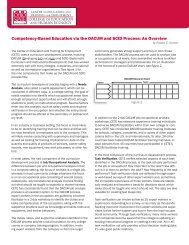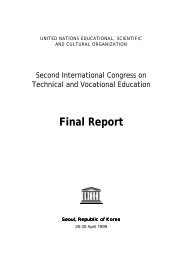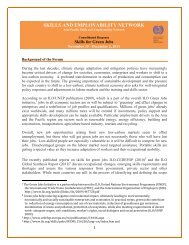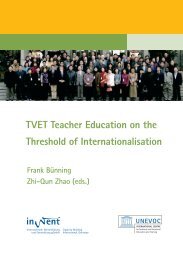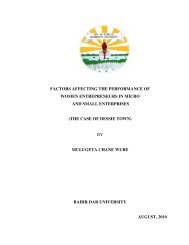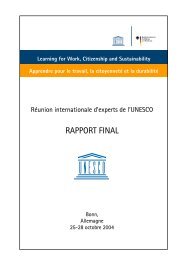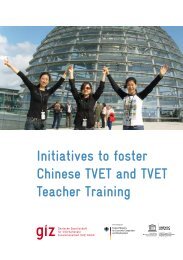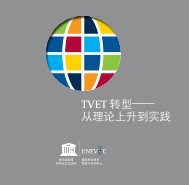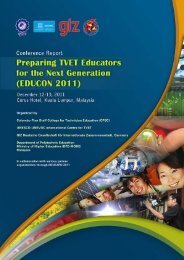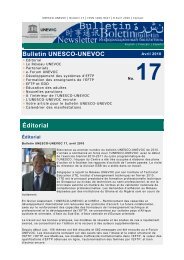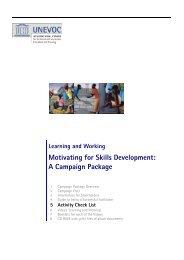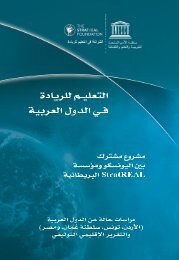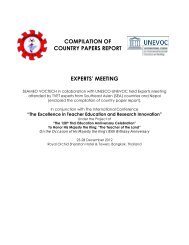Corporate HRD and Skills Development for ... - Unesco-Unevoc
Corporate HRD and Skills Development for ... - Unesco-Unevoc
Corporate HRD and Skills Development for ... - Unesco-Unevoc
You also want an ePaper? Increase the reach of your titles
YUMPU automatically turns print PDFs into web optimized ePapers that Google loves.
The ASEAN Perspective<br />
In 2004, ASEAN founded the „Initiative <strong>for</strong> ASEAN Integration“ (IAI). The strategic aim was to<br />
support the ASEAN region as a whole, <strong>and</strong> in particular the new ASEAN member states<br />
(Lao PDR <strong>and</strong> Vietnam) to overcome slow developmental progress. With growing populations,<br />
socially imbalanced economic developments, <strong>and</strong> the lack of qualifications, the IAI aims <strong>for</strong> an<br />
intensified integration of the ASEAN region within a framework <strong>for</strong> the ASEAN Economic<br />
Community (AEC) <strong>for</strong> the free flow of commodities, services, investment, <strong>and</strong> qualified<br />
work<strong>for</strong>ces – all in an ef<strong>for</strong>t towards integration.<br />
Against this overarching aim, all governments in ASEAN are dedicated to the TVET/VET<br />
sector, but most qualifications are only recognized within the given country or within specific<br />
sectors. Improvements are needed in institutional arrangements to make them more effective<br />
tools <strong>for</strong> national skills development, quality assurance, <strong>and</strong> labour flexibility.<br />
In addition, there is a widespread perception in the region that globalization <strong>and</strong> economic<br />
integration are making learning <strong>and</strong> training policies even more important. A well-trained work<br />
<strong>for</strong>ce is the key to providing domestic firms with a competitive edge. Workers there<strong>for</strong>e require<br />
a higher level of training to adapt to accelerating technical <strong>and</strong> market changes. But this presents<br />
a major challenge to many countries in the region, which education <strong>and</strong> training policies alone<br />
cannot address. Their effectiveness <strong>and</strong> success depends on a number of incentive policies.<br />
They should go h<strong>and</strong>-in-h<strong>and</strong> with economic, employment, <strong>and</strong> other policies to establish, in an<br />
equitable manner, the new knowledge <strong>and</strong> skills-based society in the global economy.<br />
In this context, the development of knowledge <strong>and</strong> skills cannot be a one-off ef<strong>for</strong>t, but<br />
instead needs to be a continuous, or a lifelong, process. The new Human Resources <strong>Development</strong><br />
<strong>and</strong> Training Recommendation, adopted at the 2004 International Labour Conference, provides<br />
effective guidance <strong>for</strong> future education, training, <strong>and</strong> lifelong learning policies to assist member<br />
states dealing with these complicated issues.<br />
However, many countries in Asia <strong>and</strong> the Pacific, as noted above, are struggling to respond<br />
to the skills needs of their work<strong>for</strong>ce in a time of increasing globalization, which involves new<br />
technology <strong>and</strong> changing patterns of work. It is difficult <strong>for</strong> these countries to get access to the<br />
latest in<strong>for</strong>mation in innovative training policies – or practice <strong>and</strong> system re<strong>for</strong>m – that would<br />
allow them to make the necessary changes. At the same time, there are other more advanced<br />
economies in the region which have developed many new approaches to skills development as<br />
a response to the emerging challenges <strong>for</strong> skills development. There are many interesting<br />
examples in the region of how skills development has been used in an integrated way to promote<br />
social <strong>and</strong> economic development. There are, however, few means or networks available to<br />
facilitate the exchange of knowledge, products, <strong>and</strong> services as stated in the ILO Report 2 .<br />
2 ILO Report, ISBN 92-2-112876-8, ISSN 0074-6681<br />
4



